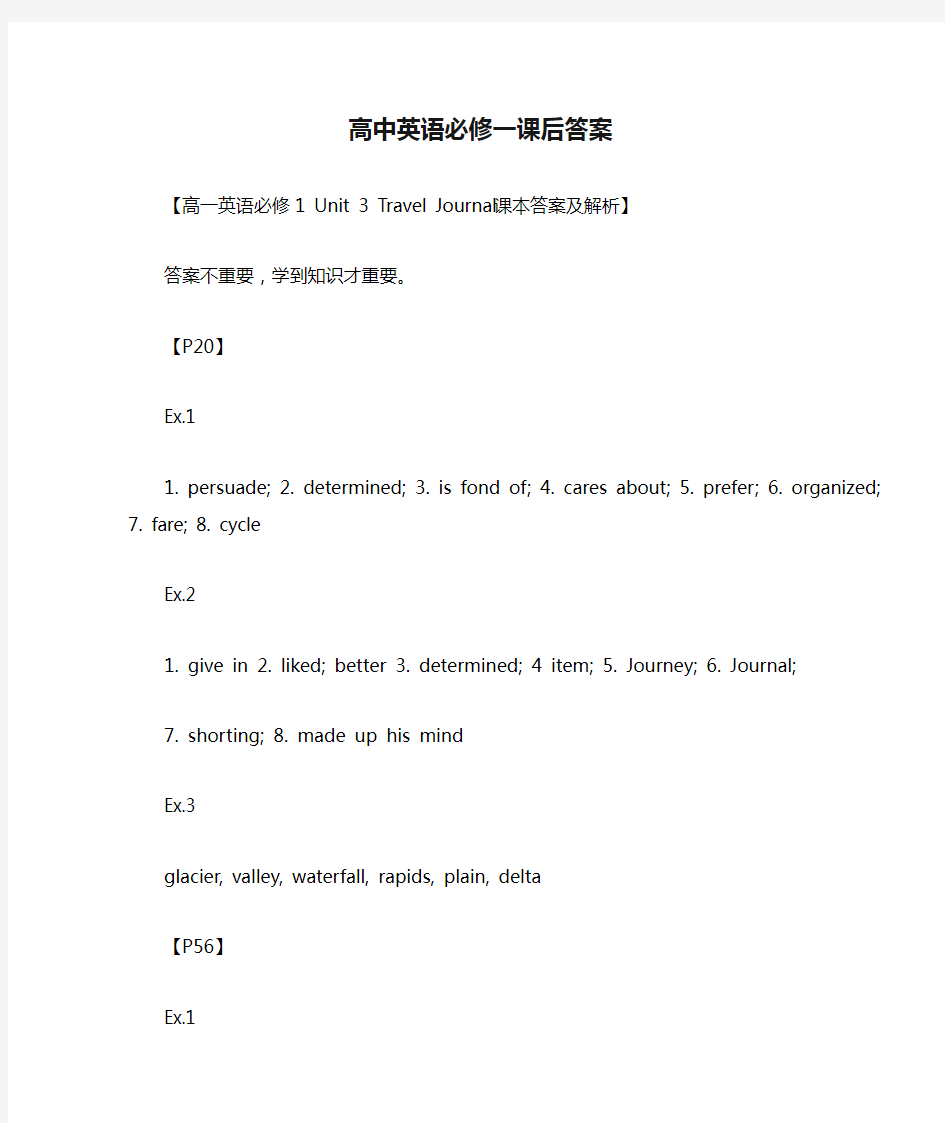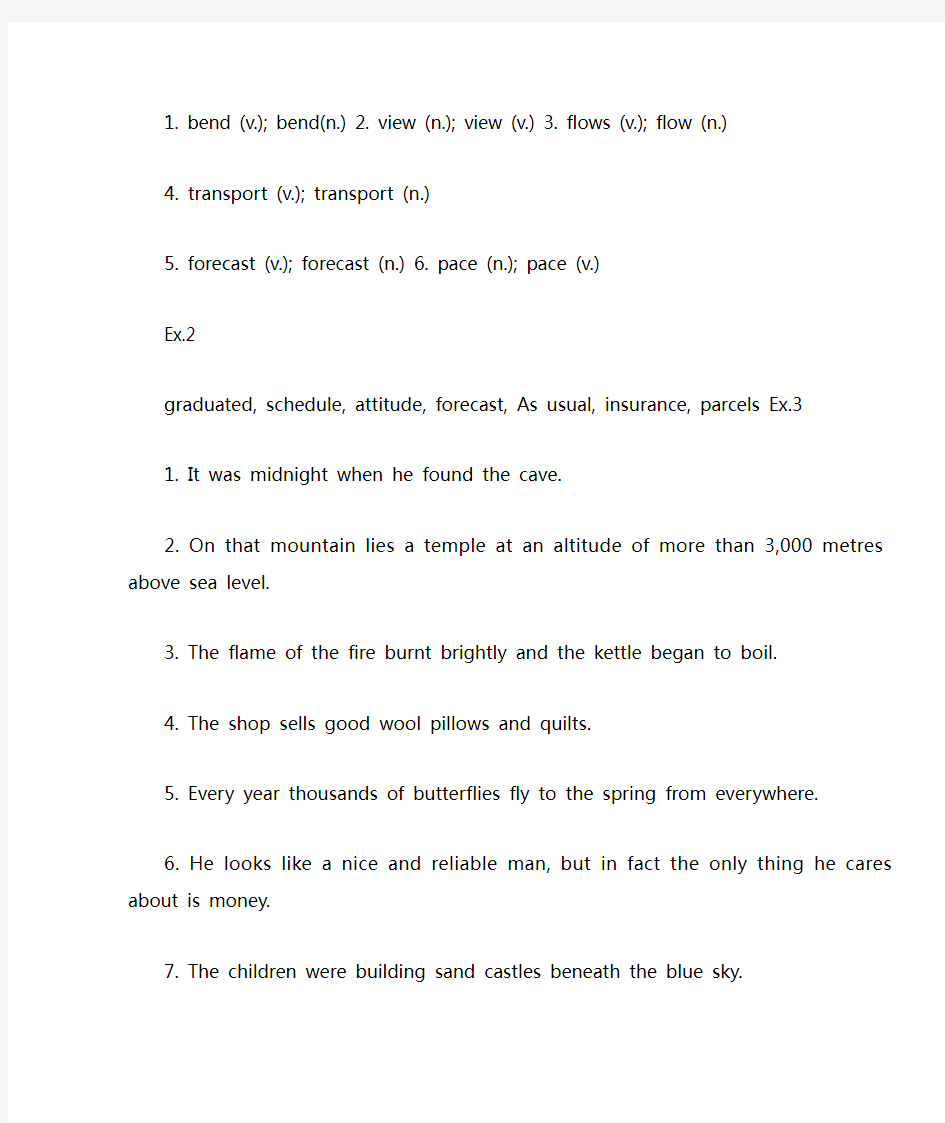高中英语必修一课后答案


高中英语必修一课后答案
【高一英语必修1 Unit 3 Travel Journal 课本答案及解析】
答案不重要,学到知识才重要。
【P20】
Ex.1
1. persuade;
2. determined;
3. is fond of;
4. cares about;
5. prefer;
6. organized;
7. fare;
8. cycle
Ex.2
1. give in
2. liked; better
3. determined; 4 item; 5. Journey;
6. Journal;
7. shorting; 8. made up his mind
Ex.3
glacier, valley, waterfall, rapids, plain, delta
【P56】
Ex.1
1. bend (v.); bend(n.)
2. view (n.); view (v.)
3. flows (v.); flow (n.)
4. transport (v.); transport (n.)
5. forecast (v.); forecast (n.)
6. pace (n.); pace (v.)
Ex.2
graduated, schedule, attitude, forecast, As usual, insurance, parcels Ex.3
1. It was midnight when he found the cave.
2. On that mountain lies a temple at an altitude of more than 3,000 metres above sea level.
3. The flame of the fire burnt brightly and the kettle began to boil.
4. The shop sells good wool pillows and quilts.
5. Every year thousands of butterflies fly to the spring from everywhere.
6. He looks like a nice and reliable man, but in fact the only thing he cares about is money.
7. The children were building sand castles beneath the blue sky.
I. 单项选择
1. The engine of the ship was out of order and the bad weather _ the helplessness of the crew at sea.
A. added to
B. resulted from
C. turned out
D. made up
[学长]
A add to是增加的意思,原句想表达的意思应该是: 坏天气使得
海上船员们更加感到无助
result from 由...导致,这里坏天气当然不可能是由船员们的无
助所导致的,因果倒置
turn out 结果是... 与句子意思不符
make up 编造,虚构与句子意思不符
2. It is everyone’s duty to ______ our school a pleasant place to learn in.
A. find
B. set
C. keep
D. make
D. 因为这里的单词后面要跟名词和形容词只有make有这个用法: make+ 名词+形容词/名词/do sth, 文是“使。。。任何”。这里表
示“每个人的责任是使到我们的成为开心学习的地方
3. Since Margot found it difficult to settle in a new place, she felt ___ that the family had to move.
A. upset
B. crazy
C. happy
D. easy
词义
4. You boys and girls, remember to write your position ______ you are told.
A. what
B. that
C. as
D. like
what 在这里引导的是一个定语从句,修饰position, 同时what 又在这个定语从句中充当宾语
中
5. When I came ______ with the teenager hidden in the cave,
I was surprised to find him _____covered with dust.
A. face-to-face; entirely
B. face to face; entire
C. in face of; pletely
D. face to face; entirely
face to face 做状语
face- to - face 做定语 (即当作形容词用)
a face-to-face meeting一个面对面的会议
They talked to each other face to face 他们面对面地谈话
in face of 面对……,在……面前,不顾……
a. 面临(不顾,公开反对,在...面前)
例句:
You should keep calm even in face of danger.
即使面临危险,你也应当保持镇静。
in the face of 在....表面上
作程度副词讲的时候没有区别,如:
You're pletely wrong= You're entirely wrong.
I'm pletely satisfied with your performance.=I'm entirely satified with your performance.
但是peltely因为是从形容词plete转化来的,它有圆满的意思在内。如:The work has been done pletely.工作圆满完成。
The work has been done entirely.工作整个做完了。
6. It was in 1969 ______ two Americans went to the moon by spaceship.
A. when
B. that
C. at that time
D. just then
B
强调句
It is(was)+强调部分+that……。
判断:去掉it is(was)和that 后,依然是完整的句子,所以是强调句。
7. To the parents’ worry, some middle school students are ______ puter games and pletely forget their studies.
A. crazy about
B. very fond of
C. concerned for
crazy about
?
珍爱酷爱音乐爱才如命热中于游泳喜欢我热衷,着迷;狂热的 D. serious about
concerned for对…关心印度的关注工作中儿童组织
serious about
? 严肃;认真对待
8. The heavy rain made his business _______ a great loss.
A. suffer
B. suffer from
C. suffering
D. suffering from
suffer vi.受痛苦;受损害vt.遭受;忍受
suffer the result /heavy losses /injuries suffer from headache/illness suffer 指一般的损害、痛苦等等,但suffer from 指长期的或习惯性的痛苦或困难。
9. The village is ______what it looked like when they settled their homes there 20 years ago.
A. not any longer
B. no longer
C. no more
D. not any more
The village is not what it looked like any longer when they settled their homes there 20 years ago.这样是可以的, not..... any longer
一、 no longer与no more的意义区别1. no longer中的longer 是副词long的比较级,long有after a certain point of time(在
某一时刻以后)之意,着重表示时间的不再延续,意为“如今不再”。no longer等于not... any longer。2. no more中的more是many / much的比较级,more有again之意,着重表示数量或程度的减少,意为“再也没有更多(大)的数量(程度)”。no more等于not... any more。
二、时态区别
1. no longer / not... any longer表示不再继续或再现过去某一时刻发生或存在而一直延续的动作 / 状态时,常用于过去时、现在时或将来时的句子中。如:
He was no longer a thief. 他不再是小偷了。
When there is no gravity, our feet no longer stay on the ground. 如果没有重力,我们的脚就不能再站稳在地面上。
2. no more / not... any more表示再也不重复过去反复发生的动作时,常用于过去时或将来时的句子中。如:Now she wasn't afraid any more. 现在她再也不害怕了。
三、位置区别
